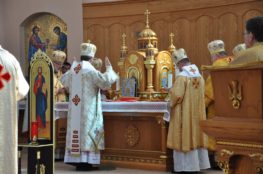It didn’t receive as much play in the blogosphere as I expected, but George Weigel’s “An Open Letter to the Patriarch of Moscow,” housed over at First Things, is still worth reading. It is worth reading not because Weigel’s neoconservative political posture isn’t nauseating, but because it should remind certain Catholics who have doe eyes for “neo-Holy Russia,” i.e., the apparent resurgence of symphonia between the Russian Orthodox Church (ROC) and the government of Vladimir Putin, that, at this juncture at least, support for Russia and her church is a betrayal of the Ukrainian Greek Catholic Church (UGCC).
Ever since the events of the Euromaidan culminated in the departure of former Ukrainian president Victor Yanukovych followed by Russia’s (likely illegal) annexation of Crimea, leading officials of the ROC, particularly Metropolitan Hilarion Alfeyev, have engaged in a persistent slander campaign against the UGCC, blaming it for inciting violence and giving support to far right/fascist political groups. In fact, the anti-UGCC rhetoric quick spilled over into accusations of neo-Nazism by some Orthodox. “Nazi,” polemically speaking, plays better than the comparatively drab “fascist.”
While there are numerous examples in the Orthodox and Catholic press of Alfeyev denouncing the “Uniates” in Ukraine, this June, 4, 2014 example, taken from the Moscow Patriarchate’s website, is particularly egregious:
The main problem that remains in our bilateral relations is the situation in Western Ukraine, relations between the Orthodox and Greek Catholics. These relations soured at the end of the 1980s, when Greek Catholics seized Orthodox churches. I do not want to get into the history now: views of history always differ between conflicting parties. But the conflict has not been overcome: in Western Ukraine there are many places where the Orthodox, as before, have been deprived of their churches, as we regularly remind our partners in the Roman Catholic Church. True, in recent times we have had some good news from Western Ukraine. Hope has appeared that the Diocese of Lviv of the Ukrainian Orthodox Church of the Moscow Patriarchate will receive land and a building for the creation of a religious center. This is something that we had been unable to accomplish for many years.
As I have discussed in other forums before, UGCC/ROC relations “soured” at the end of the 1980s because the UGCC was granted the freedom to exist. Once that freedom was granted, millions of Catholic faithful, along with 1,000 UGCC clergy, emerged from their catacomb existence. Prior to that, the UGCC had been outlawed by the Soviet-Russian state in 1946 and its properties were seized and transferred to the ROC. Although history clearly shows that the UGCC did not always behave with rectitude during the four centuries following the 1596 Union of Brest, the same is true of the ROC. But in the above quote you have Alfayev lamenting the loss of properties illicitly taken in the 20th C. as if they had always belonged to the Orthodox. More appalling still is Alfayev’s refusal to admit to, or apologize for, the brutal and bloody suppression of the UGCC during the 20th C.
Now, compare Alfayev’s statement to one issued recently by the UGCC’s head, Major-Archbishop Sviatoslav Shevchuk, and quoted by Weigel in his open letter:
The Ukrainian Greek Catholic Church is not an enemy of the Russian Orthodox Church. We are your brothers; we have been born from the same spiritual womb. From the holy city of Kyiv, where our peoples were baptized, we are sending you a message of peace. Do not let politicians provoke hatred and bloodshed among us.
The differences in outlook couldn’t be more striking. In an address earlier this month to the 4th annual Orthodox-Catholic Forum, Alfayev once again blamed the “Uniates” for the violence in Ukraine and undermining “canonical Orthodoxy.” How? By existing? That question may seem sarcastic, but in truth it gets right to the heart of the matter. The ROC’s political-theological outlook, the same outlook that has no time for any intra-Orthodox discussions of primacy which do not place the Patriarch of Moscow at the center, sees the entire territory of Ukraine as belonging to it by right. The ROC imagination cannot contemplate how or why Christians, faithful to their Slavo-Byzantine liturgical, spiritual, and theological patrimony, would want to be “Western,” i.e., Catholic. For Alfeyev and many of his conferees in the ROC, to be Slavo-Byzantine in rite is to be Orthodox; it is not possible to be anything else. That position may strike some Catholics as rather queer given the diversity of rites that exists within the worldwide Catholic Church, but for the Orthodox — particularly the Russian Orthodox — the ritual, and all that accompanies it, is near-total. And so when Major-Archbishop Shevchuck speaks of a shared religious inheritance between the two separated Eastern communions, the Russian Orthodox only hear gibberish.
As for Weigel’s open letter, it won’t do much good. Given its smug tone and unsubtle potshots, it will be, at best, ignored or, at worst, held up by the ROC as another example of evil Western and/or pro-“Uniate” Catholic propaganda from the pen of a reputed hawk and troublemaker. (Weigel’s Polish heritage probably won’t help matters either.) I doubt that Weigel expects much from his effort anyway. A private letter would have seemed more sincere. Even so, none of that means Weigel isn’t speaking the truth about the sorry behavior of the ROC during the crisis in Ukraine, nor is he off base when he suggests, in a rather patronizing tone, that the ROC “does not have the tradition of confronting state power that developed in many parts of western Christianity over centuries.” Now would be as good a time as any to establish such a tradition, but the desire to do so will have to spring from the heart of the ROC itself, not neoconservative goading.



